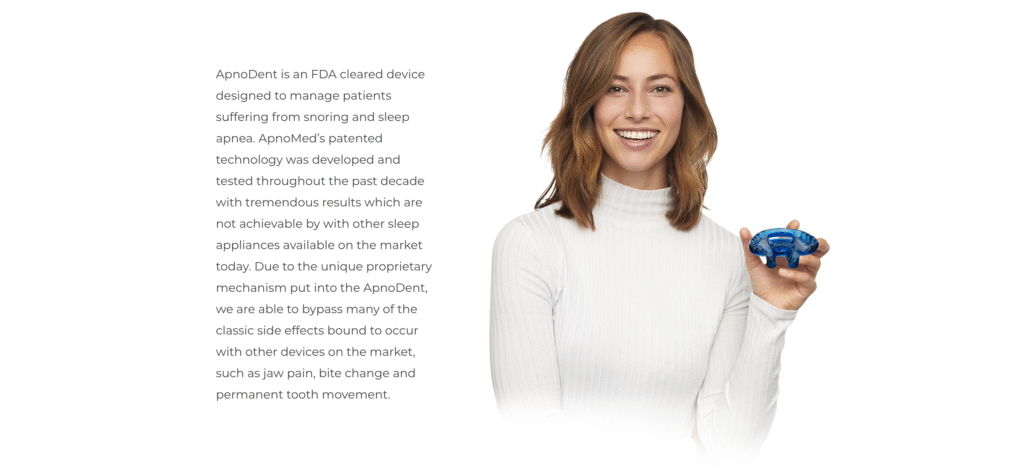Sleep apnea and snoring affect millions of people, and while oral appliances can be a helpful alternative to CPAP machines, they’re not without drawbacks. Many users experience jaw discomfort or notice their teeth shifting over time. But one company, ApnoMed, has developed a new approach that may change that.
A Different Kind of Sleep Device
ApnoMed’s ApnoDent® is an FDA-cleared oral appliance designed by an orthodontist specifically to minimize the unwanted tooth movement and bite changes that can occur with traditional sleep apnea devices.
Instead of relying on constant forward pressure on the jaw, the ApnoDent uses a patented mechanism that gently positions the lower jaw to open the airway while reducing strain on the teeth and joints. This means users may breathe easier at night — without the same risk of dental changes that have made other devices uncomfortable for long-term use.
According to the company, their design “bypasses many of the classic side effects” seen with standard mandibular advancement devices — such as jaw pain, bite shifts, and permanent tooth movement.
Backed by Recent Research
ApnoMed’s approach isn’t just theoretical. The company recently published a peer-reviewed study in the Journal of Dental Sleep Medicine (read it here).
In that study, 91 patients who used the ApnoDent for 6–12 months reported impressive results:
-More than 90% of participants with mild to moderate sleep apnea saw their condition improve to normal levels.
–95% experienced relief from jaw pain and TMJ-related symptoms.
-No significant bite changes or tooth movement were reported during the study period.
While these findings are promising, the researchers emphasized the need for larger, long-term clinical studies to confirm these results and better understand how the device performs over time.
What It Means for Sleep Apnea Patients
For people who struggle with CPAP machines or worry about the dental side effects of other oral appliances, this technology could represent a meaningful step forward. The fact that it was designed by an orthodontist — someone who deeply understands how the bite and jaw work together — adds an extra layer of reassurance.
Still, it’s important to remember that every patient is different. If you’re experiencing snoring or sleep apnea symptoms, talk to a qualified sleep medicine provider before trying any treatment.
Disclaimer:
This post is for informational purposes only and is not medical advice. Always consult your healthcare provider before starting or changing any treatment for sleep-related breathing disorders. This is not a paid endorsement or sponsored content.
For more information about the ApnoDent device and ApnoMed’s research, visit apnomed.com.

